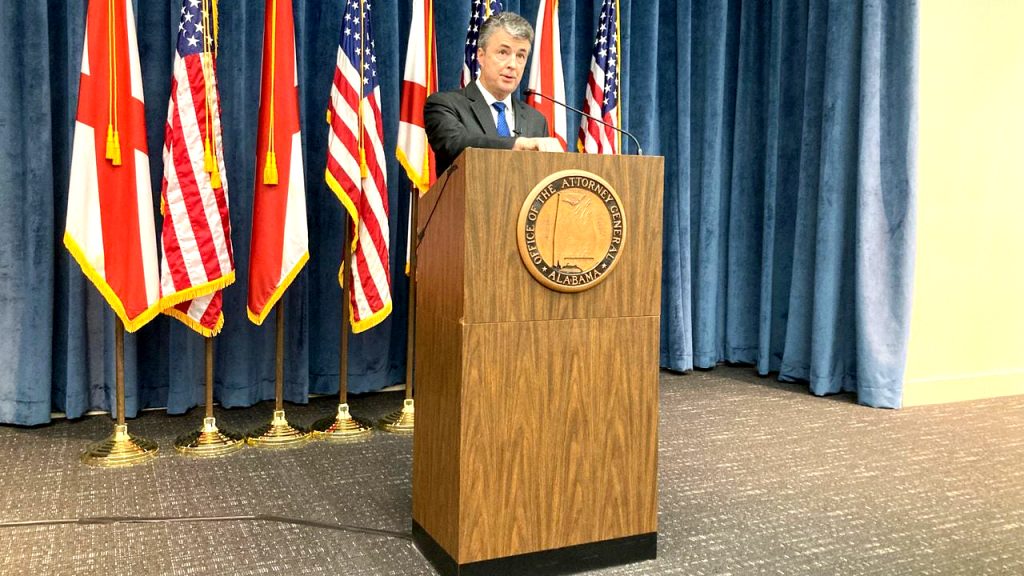By Mike Cason
Alabama Attorney General Steve Marshall said Thursday night’s execution of Kenneth Eugene Smith by nitrogen hypoxia went according to plan for the never-used method.
Marshall held a press conference Friday morning about Smiths’ execution for the 1988 murder of Elizabeth Dorlene Sennett in Colbert County.
Marshall praised the work of the Alabama Department of Corrections.
“As everyone knows, they are the first team in the country to carry out nitrogen execution,” Marshall said. “And what occurred last night was textbook. They deserve a great deal of thanks and credit for being willing to be the one to step up first in the country to do so and I now suspect that many states will follow.
“As of last night, nitrogen hypoxia as a means of execution is no longer an untested method. It is a proven one.”
Marshall said 43 other Alabama death row inmates have requested execution by nitrogen hypoxia.
Alabama law still makes lethal injection the default method of execution.
Witnesses said Smith writhed and showed convulsive movements for about two minutes after the nitrogen gas was started. Marshall was asked if that contradicted claims the state’s lawyers made in court, such as when Solicitor General Edmund LaCour Jr., said, “Alabama has adopted the most painless and humane method of execution known to man.”
“The execution last night was not at all contrary to anything we filed but was entirely consistent,” Marshall said.
Dr. Joseph Antognini, an anesthesiologist who submitted a declaration to the court on behalf of the state, had said he expected the state’s protocol would likely result in “35 to 40 second time to unconsciousness, death in 10 to 15 minutes after nitrogen begins flowing.”
The state’s redacted protocol for nitrogen hypoxia, first released in August, said nitrogen gas would be administered for 15 minutes or five minutes after a flatline on an EKG, whichever is longer.
Marshall said he could not provide an exact time when the nitrogen flow started on Thursday night or when the EKG showed a flat line.
Katherine Robertson, chief counsel for the attorney general’s office, said Marshall gave Alabama Department of Corrections Commissioner John Hamm the go-ahead to begin the execution at 7:56 p.m.
Witnesses said Smith writhed and thrashed for about two minutes. That was followed by five to seven minutes of heavy breathing. Witnesses said Smith stopped moving about 8:08 p.m.
The curtain to the witness room closed at 8:15 p.m., and doctors pronounced Smith dead at 8:25 p.m.
Smith’s defense team and experts had expressed several concerns about the state’s protocol, including that air could leak in around the mask and prolong the execution or leave Smith in a vegetative state or cause a stroke. Another concern was that Smith would vomit into the mask and choke. There was no indication that Smith vomited.
The Associated Press reported that attorneys for Alabama death row inmates who have requested nitrogen hypoxia executions have asked the court to order Alabama to turn over records and information about Smith’s execution.
“The State promised the world the most humane method of execution known to man,” attorney John Palombi, who represents death row inmates who requested nitrogen, said in a statement. “Instead, Mr. Smith writhed and thrashed before he died. No further executions should take place by this method until the events of this evening are examined by an independent body.”
Amnesty International was one of many advocacy organizations that spoke out against Thursday night’s execution. The way it unfolded did not change the organization’s view.
“The death penalty is the ultimate cruel, inhuman and degrading punishment and accounts of Kenneth Smith’s last moments simply show that there is no humane way to take someone’s life,” Justin Mazzola, researcher for Amnesty International, said in a statement. “It is high time for those in power to stop trying to fix the failed experiment that is the death penalty. Instead, they should devote all resources and focus on alternatives that would more effectively address crime at its roots and protect human rights. We call on the Alabama authorities to immediately establish a moratorium on all executions as a first critical step towards abolition.”
Amnesty International’s statement also noted that Smith’s jury in 1996 recommended by 11-1 a sentence of life without parole. The judge did not follow that recommendation and sentenced Smith to death. Alabama changed the law in 2017 to give juries the final determination on whether someone convicted of a capital crime receives the death sentence or life in prison.
Marshall said there will be more nitrogen executions in Alabama. He said his regret was that it took so long to carry out. Smith had been on death row since 1996.
“I want to tell the family, especially the victim’s sons, Mike and Chuck, how genuinely sorry I am for the horrific manner in which their mother lost her life,” Marshall said. “But I also want to apologize to them for how long it took for this sentence to be carried out.
“I watched the family address the media last night, in which they showed the most remarkable humility and grace in the most difficult circumstances that no one else would want to be in. But you know that forgiveness and justice are not mutually exclusive. And their words will stick with me for a long time.”
Marshall said his office will help other states that want to impose the death penalty by nitrogen hypoxia.
“To my colleagues across the country, many of which were watching last night, Alabama has done it,” Marshall said. “And now so can you. And we stand ready to assist you in implementing this method in your states.”












